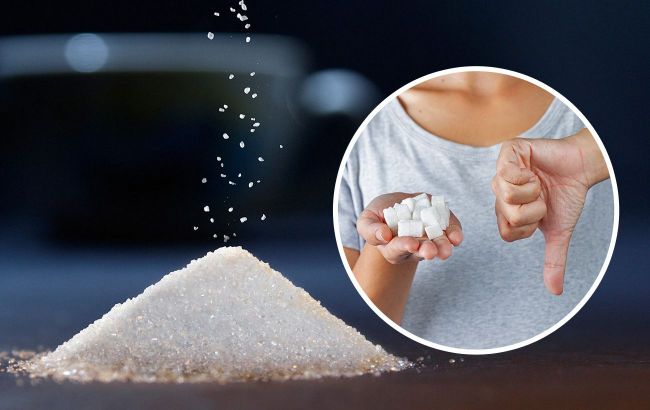12 reasons to reduce sugar in your diet right now
 Why you should eat less sugar (Collage: RBC-Ukraine)
Why you should eat less sugar (Collage: RBC-Ukraine)
Sugar is often considered a product that adversely affects health. Worldwide, doctors advise limiting its intake or at least minimizing it, according to WebMD.
Here are 12 reasons that can help reduce sugar consumption right now:
The bitter side of sugar
Sugar is sweet, but its excessive consumption can negatively impact your health. Opt for products containing natural sugars like fruits, vegetables, dairy, and grains. Your body slowly digests these carbohydrates, providing cells with a steady energy supply. Packaged products and beverages, on the other hand, contain added sugar that your body doesn't need.
How much is too much?
The American Heart Association recommends consuming no more than 6 teaspoons (25g) of added sugar per day for women and 9 teaspoons (36g) for men. However, people typically consume between 20 to 22 teaspoons per day (over 80g). For example, a small soda can contain 10 teaspoons of sugar with no nutritional benefit.
Weight gain
Sugar-sweetened beverages are a significant source of added sugar. If you drink a can of soda every day without reducing calories elsewhere, you may gain 7 kg in three years. Excess weight can lead to problems such as diabetes or certain types of cancer.
Cardiovascular diseases
One in ten people receives 1/4 or more of their daily calories from added sugar. Research indicates that those who consume high amounts of sugar have double the chances of dying from cardiovascular diseases compared to individuals who consume significantly less sugar.
Diabetes
Sweetened beverages can increase the risk of developing type 2 diabetes. This occurs when sugar remains in your blood, and your body responds with reduced insulin production. Insulin is essential for converting the food you eat into energy. If you are overweight, shedding 5-7 kg can help control blood sugar levels.
High blood pressure
While salt is commonly blamed for hypertension, some studies suggest that sugar may also contribute. Scientists believe that sugar may elevate blood pressure due to excessively high insulin levels, making blood vessels less flexible and prompting the kidneys to retain water and sodium.
High cholesterol levels
Sweet products are harmful to the heart, regardless of your weight. They can:
- Increase levels of "bad" cholesterol and decrease levels of "good" cholesterol.
- Raise blood fat levels called triglycerides and hinder the function of the enzyme that breaks them down.
Liver issues
Most packaged products, snacks, and beverages are sweetened with fructose, a simple sugar from fruits and vegetables. Your liver converts it into fat. Regularly nourishing your body with fructose can lead to the accumulation of tiny fat droplets in the liver, causing non-alcoholic fatty liver disease. Early dietary changes can reverse this process, but over time, swelling and scarring may damage the liver.
Tooth decay
Sugar feeds bacteria in the mouth, leaving behind acid that destroys tooth enamel. Sweetened beverages, dried fruits, candies, and chocolate are frequent culprits. Sour candies, in particular, are among the worst, being nearly as acidic as battery acid. If you indulge, rinse your mouth with water immediately or drink a little milk to neutralize the acid.
Poor sleep Consuming a lot of sugar throughout the day can impact blood glucose levels, leading to spikes and energy crashes. This can make it difficult to stay alert at work, and there's a risk of dozing off during school lessons. Having a bowl of ice cream or cookies in the evening can load you with sugar, potentially disrupting your deep sleep and causing you to wake up unrested.
Mood issues
If you frequently feel down, your sweet tooth might be part of the problem. Some studies suggest a connection between sugar and mental health issues. One recent study revealed that men who consumed over 65g of sugar per day (twice the recommended amount) had a 23% higher likelihood of experiencing anxiety or depression.
Gout risk
Excessive consumption of red meat, organ meats, and shellfish can lead to painful arthritis known as gout. Unfortunately, fructose, found in sugar, is also on the list of culprits. It can contribute to the accumulation of uric acid in the blood, forming solid crystals in joints like the big toe, knees, and other areas.
Accelerated aging
Sugary beverages can increase your biological age by several years. DNA, protected by structures called telomeres at the ends of chromosomes, safeguards against damage. The longer, the better. Shortened telomeres can accompany age-related diseases like diabetes. One study found that people who drink a glass of soda every day may experience a shift in cell age equivalent to 4 years.
Earlier, we talked about why it's not recommended to treat a cold or acute respiratory viral infection.
We also wrote about eight habits that can help you extend your life after the age of 40.
This material is for informational purposes only and should not be used for medical diagnosis or self-treatment. Our goal is to provide readers with accurate information about symptoms, causes, and methods of detecting diseases. RBС-Ukraine is not responsible for any diagnoses that readers may make based on materials from the resource. We do not recommend self-treatment and advise consulting a doctor in case of any health concerns.

